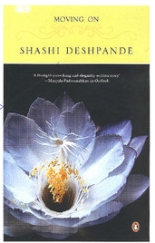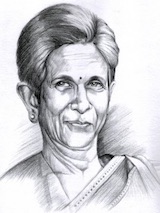Moving On
Shashi Deshpande
|
|
Starting a Shashi Deshpande novel is like sitting in a railway compartment and resigning oneself to an endless journey into the night of middle-class India. The very proximity of the stranger sitting opposite is disturbing. On top of this, he, or most likely she, is the kind who will stake her territory with a carefully rolled bedding, one who would bring out a stainless steel tiffin carrier and insist that you partake of a meal with her. It is enough to set your teeth on edge. At the same time Deshpande’s skill is such that by the end of the journey you are completely enwrapped in the lives of the people that she forces you to contemplate. The very blandness of her characters, the ordinariness with which she anoints them at the outset gradually works in their favour. Every life, she seems to be telling us, has its own meaning and in the general bleakness, this itself becomes a source of strength. That life is not only a parade of colours and sounding of distant trumpets, as the more flamboyant storyteller has told us, but an examination of the way in which people get on with their lives, one step at a time. Or more likely, do not get on with their lives, just ask questions that are most often met with deafening silence. It is not surprising that Deshpande’s best-known novel That Long Silence confronts it. The difference or awkwardness is that she is probing them with a woman’s voice and her conclusions are still inclined to be tentative. The posing of these questions is what makes her new book riveting, despite the stubborn insistence that we meet right on the first page – an old man, who is writing his last testimony, tells us that he finds it difficult to get the words out. The inability or refusal of people to communicate with each other, as marriage partners, parents, friends and lovers is underlined by the intricately meshed structure of the novel. Unusually for Deshpande, she writes about sex as a means of creating this contact perhaps it is the Erica Jong effect, since she cites Jong as a source of inspiration. Using a sexual motif as part of the denouement weakens the structure and leaves it with an abrupt ending suited to a short story. One also wonders whet her Deshpande moves between two types of value systems, one that questions and the other that accepts. Her characters seem to fall into the acceptance mode, even as she excels in the Platonic method of looking for answers. As the old man writes in his journal, what he valued most in his friends was “an excitement about ideas, a passion for knowledge and this knowledge an end in itself, not a means to an end”. This is what makes Deshpande special. She does not shirk from the big questions, grief, betrayal death, but finally it is about life. She forces us to accept Indian life in all its stifling details and its magnificent unpredictability.
Shashi Deshpande |


